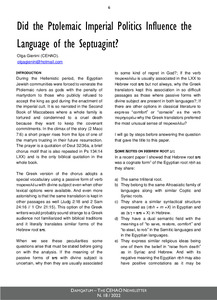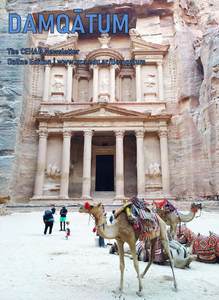Por favor, use este identificador para citar o enlazar este ítem:
https://repositorio.uca.edu.ar/handle/123456789/16109| Campo DC | Valor | Lengua/Idioma |
|---|---|---|
| dc.contributor.author | Gienini, Olga A. | es |
| dc.date.accessioned | 2023-03-30T11:49:31Z | - |
| dc.date.available | 2023-03-30T11:49:31Z | - |
| dc.date.issued | 2022 | - |
| dc.identifier.citation | Gienini, O. A. Did the ptolemaic imperial politics influence the language of the septuagint? [en línea]. Damqatum. The CEHAO newsletter. 2022 (18). Disponible en: https://repositorio.uca.edu.ar/handle/123456789/16109 | es |
| dc.identifier.issn | 1852-6594 | - |
| dc.identifier.uri | https://repositorio.uca.edu.ar/handle/123456789/16109 | - |
| dc.description.abstract | During the Hellenistic period, the Egyptian Jewish communities were forced to venerate the Ptolemaic rulers as gods with the penalty of martyrdom to those who publicly refused to accept the king as god during the enactment of the imperial cult. It is so narrated in the Second Book of Maccabees where a whole family is tortured and condemned to a cruel death because they want to keep the covenant commitments. In the climax of the story (2 Macc 7:6) a short prayer rises from the lips of one of the martyrs trusting in their future resurrection. The prayer is a quotation of Deut 32:36a, a brief chorus motif that is also repeated in Ps 134:14 LXX) and is the only biblical quotation in the whole book. The Greek version of the chorus adopts a special vocabulary using a passive form of verb παρακαλέω with divine subject even when other lexical options were available. And even more astonishing is that the same translation is kept in other passages as well (Judg 2:18 and 2 Sam 24:16 // 1 Chr 21:15). This option of the Greek writers would probably sound strange to a Greek audience not familiarized with biblical traditions and it literally translates similar forms of the Hebrew root נחם... | es |
| dc.format | application/pdf | es |
| dc.language.iso | eng | es |
| dc.publisher | Pontificia Universidad Católica Argentina. Facultad de Ciencias Sociales. Departamento de Historia. Centro de Estudios de Historia del Antiguo Oriente | es |
| dc.rights | Acceso abierto | * |
| dc.rights.uri | http://creativecommons.org/licenses/by-nc-sa/4.0/ | * |
| dc.source | Damqatum. The CEHAO newsletter.No.18, 2022 | es |
| dc.subject | HELENISMO | es |
| dc.subject | JUDIOS | es |
| dc.subject | EGIPTO | es |
| dc.subject | HISTORIA ANTIGUA | es |
| dc.subject | SEPTUAGINTA | es |
| dc.subject | HISTORIA POLITICA | es |
| dc.title | Did the ptolemaic imperial politics influence the language of the septuagint? | es |
| dc.type | Artículo | es |
| uca.disciplina | HISTORIA | es |
| uca.issnrd | 1 | es |
| uca.affiliation | Fil: Gienini, Olga A. Pontificia Universidad Católica Argentina. Centro de Estudios de Historia del Antiguo Oriente; Argentina | es |
| uca.version | publishedVersion | es |
| item.fulltext | With Fulltext | - |
| item.grantfulltext | open | - |
| item.languageiso639-1 | en | - |
| Aparece en las colecciones: | DAM 2022 | |
Ficheros en este ítem:
| Fichero | Descripción | Tamaño | Formato | |
|---|---|---|---|---|
| did-ptolemaic-imperial.pdf | 429,33 kB | Adobe PDF |  Visualizar/Abrir | |
| damqatum-18.jpg | 484,88 kB | JPEG |  Visualizar/Abrir |
Visualizaciones de página(s)
76
comprobado en 27-abr-2024
Descarga(s)
41
comprobado en 27-abr-2024
Google ScholarTM
Ver en Google Scholar
Este ítem está sujeto a una Licencia Creative Commons

